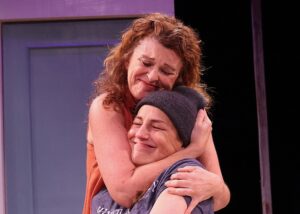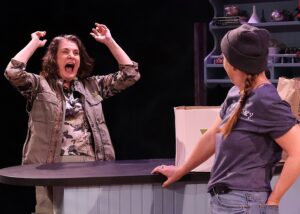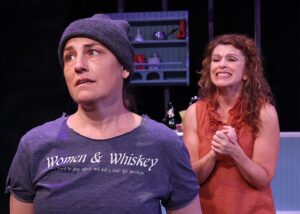The cottage, an Airbnb in Provincetown, with its faded floral-print couch, unreliable landline phone, and feebly locking doors, feels like the set of a horror film, says Jojo (Susan Lambert). Bright-eyed and giddy, she’s brought champagne and a large suitcase for what she thinks is a celebratory reunion with her lifelong best friend, Michaela (D’Arcy Dersham). But Michaela isn’t so bubbly. She’s measured, methodical, and sure of what she wants. She’s limping.

The two women, both 50 years old, have met in the cottage to plan for the future, but The Fade-Away Advantage, written by Meryl Cohn and directed by Rebecca Berger, takes place in a single night. The play had its world premiere on Oct. 3 at the Provincetown Theater, where the production continues through Oct. 20.
The set, designed by Ellen Rousseau, with lighting by Stephen Petrilli, does feel vaguely threatening — but only in the way that anywhere but home is somehow strange and unreal. That, and there’s a ghost in the walls. The spirit is not mean, says the Airbnb host, Baby Barilla (Janet Geist Moore) — she’s just critical. The lights flicker when she’s unhappy, and she creaks. One might say she croaks.
Baby is frantic and obtrusive. Unfortunately for Jojo and Michaela, who throughout the play express their desire to be alone with each other, there’s a connecting door between the cottage and the main house where Baby lives. Baby bursts through frequently and without invitation. She carries a pot of stew and says she’s experimenting with “Airbnb experiences.” She calls Jojo and Michaela “girls.” Do they want to go clamming? Hunting? She hunts wild game. And she’s got advice: don’t open the door for her son Alfred (Nathaniel Hall Taylor), who might knock. He’s unnaturally large, she says, “with arms like tree trunks.”
Alfred is a comedic character — his scenes elicited some of the most raucous laughter of the evening — but, like all the characters Cohn has expertly deposited into this claustrophobic cottage, he’s guided by a distinct set of morals and values. Each character has depth — there’s nowhere to go onstage but within.

Baby storms on and off stage in a whirlwind. Moore embodies her in voice and gesture: she’s painfully eccentric, undeniably weird, and desperate to please. And despite her slapstick tendencies, her monologue about her real job — more than a rental host — toward the end of the play is one of the most tender and beautiful in the script.
Jojo, who radiates optimism and a sort of in-denial frivolity, is really a deeply insecure, awkward woman. Michaela calls her unreliable, and that wounds her. Lambert wears Jojo’s expressions like they’re paintings: she flirts with euphoria and sickening dread. All she really wants is to delay the unimaginable.
Michaela has an unimaginable plan, but she’s done more than imagine it: she’s planned it out, step by step. More than anything, she wants control. Dersham, making her Provincetown Theater debut, disappears effortlessly into her character. Michaela mostly smiles through her pain, but sometimes, in moments of darkness, she lets the smile drop. Then the audience seems to suffocate in the deoxygenated air.
The play runs one hour, 45 minutes with no intermission. Dersham and Lambert are offstage for only a few minutes each: out the front door or in the bathroom. Whenever one of the friends is alone, the cottage feels devouring. Something bad is going to happen, we think. Something irreversible. When Jojo and Michaela rejoin each other, we breathe again.

The Fade-Away Advantage offers an abbreviated lesson on existence. What does it really mean for everything to end? But more than that: what does everything mean if it all will end?
Cohn’s script is simultaneously witty and meditative, sexy and absurd. It defies our expectations more than once. Baby barges in until she’s needed — then she doesn’t come. There very well might be a ghost in the cottage, but she doesn’t mean much to anyone but Baby. Jojo and Michaela are best friends and maybe more.
Their relationship, put to the test in more ways than one over the course of the play, evades definition. We haven’t seen each other in too long, the two friends say near the beginning. As the play goes on, and the women revolve around each other in their tight quarters, the question changes from “Where were you?” to “Where are you?” I’m here, they tell each other, and they each ask the other: but for how long?
When Michaela makes a decision at last, the one that has loomed over the play for almost two hours, it comes with a sense of relief. The play ends and we think: all things do.
’Fore It Fades
The event: The Fade-Away Advantage, a new play by Meryl Cohn
The time: Through Oct. 20, Thursdays-Saturdays, 7 p.m., Sundays at 2 p.m; additional performances on Oct. 14 and 16 at 7 p.m.
The place: The Provincetown Theater, 238 Bradford St.
The cost: $55 at provincetowntheater.org
